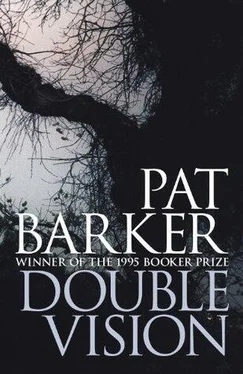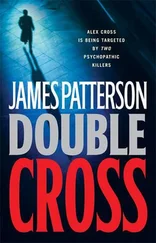After Peter had gone, she walked round the figure again, comparing its shape with the figure in her head, mentally altering the proportions, itching to get up there, to feel the wire, but even looking up for any length of time produced pain. She had to admit defeat.
As she turned to go, she noticed that Peter had left his specs behind on the table, and she picked them up. Greasy fingerprints all over them. Impossible to keep glasses clean in a studio. She went over to the sink, dampened a sheet of kitchen paper and worked at the lenses till they were clean, holding them up against the light to check she’d removed every mark. She hoped he was all right to drive without them. Experimentally, she put them on, looking round the studio at the complex patterns of light and shade cast by the figure on the plinth.
Suddenly, she realized what she was not experiencing: the wave of nausea you feel when you put on somebody else’s spectacles. And she could still see perfectly well, although somebody else’s prescription lenses ought to have blurred the scene. Thinking she must be mistaken, she took them off and put them on again, but no, there was no doubt. The ‘lenses’ were clear glass.
Lots of people wear clear specs, she told herself. She put them to one side and started clearing up. But then she thought: who wears them? Rising young executives wanting to look older and more authoritative. But not gardeners. In any outdoor job glasses are a nuisance. Oh, well, not my business, she told herself firmly, and got back to work.
When she’d finished, she wrapped the specs in kitchen paper and put them by the sink, then, dragging herself reluctantly away from the warm fug of the studio, let herself out into the icy winter air.
Stephen woke before dawn. Nothing like this darkness in the city, ever. Deep black, like some of those nights in Africa. He located his body purely by the sense of touch: skin on sheets. His hands and feet were far-flung colonies. He daren’t switch the light on, because in this state he found light more frightening than darkness. All the while the details of the dream went on invading his waking mind. Being buried alive. No source of light in this dream — only the smell, gasping breaths, other people’s blood soaking him to the skin, the knowledge that if he moved or cried or stirred, the people up there, the people he never saw, were waiting with knives and guns and machetes to finish the job.
Exerting every scrap of willpower, he turned over, and stared into the darkness until beyond the swirls of orange and purple he managed to distinguish shapes: a chair, a wardrobe, the door to the landing. When he was sure he knew the way, he got out of bed — there was no point lying there, he would never get back to sleep, he was too afraid the dream would return — and naked, sweating, a pink, peeled prawn of a man — that’s how he saw himself — he edged his way downstairs, feet overlapping the sixteenth-century treads at every step. He entered the stone-flagged kitchen, where he drew back the curtains and put the kettle on for coffee.
He drank it sitting by the window, the hot fluid delineating his oesophagus, another part of his living body reclaimed from the dark. He watched the stars turn pale, saw the empty road curving towards the sleeping farmhouse, and the frost-bound fields, the fires waking in the white grass as the light strengthened. All the time he was debriefing himself, sorting out the dream. He knew if he didn’t take time to do this, it could stain and corrupt the whole day.
Before starting work, he jogged to the top of the hill. Not a breath of air, not a blade of grass or a twig stirred. On the crest he leant against a tree, watching darkness drain down the slopes of the hills as if somebody at the bottom of the valley had pulled the plug on night. Details emerged as the light grew: knobbly black buds of ash, brittle brown oak leaves still clinging to the tree, the veins on the backs of his hands. And then the sun erupted, shredding clouds, pouring streams of light down the valley, turning the moon, that lingered in blue translucent space, into a crazed eggshell.
All around him were the baby fists of new ferns, though there was a rawness in the air that threatened more snow. He began searching for the owl’s nest. It had been hooting again last night, on and on with hardly a pause, as if it thought it was a nightingale. One tree half covered in ivy looked more promising than the rest. He scuffled through the mulch of dead leaves until he found what he was looking for, picked up three or four fibrous brown pellets and put them in his pocket.
Back in the cottage, he took them out and rolled them between thumb and forefinger. He’d picked them up automatically, as he would have done as a boy, but now he thought that Adam might like them. He’d take them up this afternoon, as soon as he saw Justine’s car parked outside the house.
Relations between the farmhouse and the cottage had quickly settled into a routine. Stephen hardly saw Robert and Beth except at weekends, but observed their comings and goings almost as if they were strangers.
Both were busy, and Beth added to the strains of a full-time job by doing a lot of community work. She was a regular churchgoer. That rather surprised Stephen, because Robert was a militant atheist: ‘There is no God, and Sharkey is his prophet’ — that was Robert’s creed. So unless Beth’s brand of Christianity was remarkably accommodating, they must find plenty to disagree about.
Robert worked incredibly long hours. Sometimes, in particularly bad weather, he stayed overnight in the city rather than risk snow drifts blocking the moor road.
Or so Beth said, expressionlessly, her eyes dead.
‘Where does he stay?’ Stephen asked.
‘Oh, There’s always somebody who’ll give him a bed.’
Initially, He’d been afraid Adam would ignore the unspoken rule of no weekday contact and take it into his head to visit his uncle in the cottage. He was such a still, strange, isolated little boy. In Robert’s place he might not have thought it wise to bury Adam in the depths of the country, miles away from other children of his own age. Out of school he seemed to see nobody except his parents and Justine, whose little red Metro spluttered up the lane every day at four o’ clock, bringing him home from school. Stephen wanted to say to Robert, ‘But our childhood wasn’t like this.’ They’d run wild, at least until the first shades of the exam prison house started to close in. Contrasted with their childhood, Adam’s seemed both overprivileged and depleted. Stephen would encounter him sometimes, trotting along, searching for roadkill or following tracks in the snow, but always, except for Justine, alone.
When Stephen spoke to him, Adam would duck his head, avoid eye contact, mumble something and then, as soon as possible, drift away.
His evident disinclination to have anything to do with his uncle made Stephen perversely more interested in him. So that afternoon, shortly after Justine’s car with Adam in the back had coughed and wheezed its way up the hill, he took the owl pellets round to the house, and spread them out on a sheet of kitchen paper on the table.
‘What do you think they are?’
Adam wrinkled his nose. ‘Poo?’
No kid who regularly brought home roadkill had any right to be fastidious. ‘Wrong end. They come out of the beak.’
‘Owl pellets?’
‘Yeah.’
‘Cool.’
‘Have you got any tweezers?’ Stephen asked Justine, who was standing by the cooker, frying sausages for Adam’s tea. She didn’t look as if she had. Like everything else about her, her eyebrows were flourishing and entirely natural.
‘Got a meat skewer.’
Читать дальше












